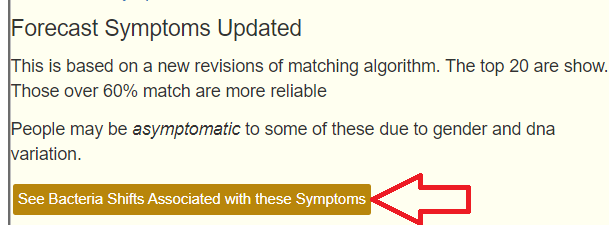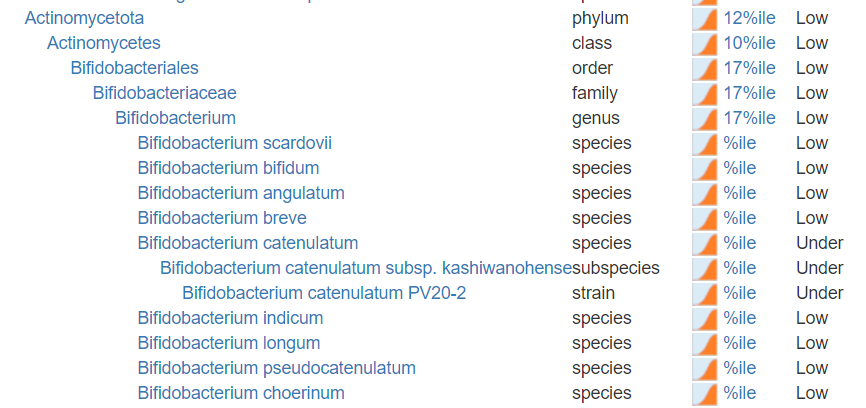A question was ask – are there significant gender differences with ME/CFS. A partial answer is possible from our citizen science data (Available here). The number of bacteria identify as statistical drops because we are reducing sample sizes. The table below shows the shifts that are seen in common with P < 0.01.
For Symptom of ME/CFS
| Source | Tax_name | tax_rank | Male | Female | Male_Chi2 | FeMale_Chi2 |
| thryve | Thermodesulfobacteria | phylum | increases | increases | 234.0375 | 138.4544 |
| biomesight | Verrucomicrobiaceae | family | increases | increases | 8.333333 | 7.262051 |
| biomesight | Rhodothermaeota | phylum | increases | increases | 179.2 | 217.3071 |
| biomesight | Akkermansiaceae | family | increases | increases | 8.718378 | 9.965634 |
| biomesight | Erysipelothrix muris | species | increases | increases | 9.533889 | 10.08333 |
| biomesight | Akkermansia | genus | increases | increases | 8.718378 | 9.965634 |
| biomesight | Rhodothermales | order | increases | increases | 179.2 | 217.3071 |
| biomesight | Akkermansia muciniphila | species | increases | increases | 8.718378 | 9.965634 |
| biomesight | Erysipelothrix | genus | increases | increases | 9.663289 | 9.663289 |
| biomesight | Rhodothermia | class | increases | increases | 179.2 | 217.3071 |
| biomesight | Thermodesulfobacteria | phylum | increases | increases | 281.1738 | 299.9112 |
ME/CFS With IBS
We find differences here.
| Source | Tax_name | tax_rank | Taxon | Male | Female | Male_Chi2 | FeMale_Chi2 |
| biomesight | Sutterella | genus | 40544 | decrease | increases | 8.333333 | 11.25018 |
| biomesight | Rhodothermales | order | 1853224 | increases | increases | 139.9274 | 114.5716 |
| biomesight | Dorea | genus | 189330 | increases | decrease | 18.75 | 16.17875 |
| biomesight | Rhodothermia | class | 1853222 | increases | increases | 139.9274 | 114.5716 |
| biomesight | Thermodesulfobacteria | phylum | 200940 | increases | increases | 280.3333 | 187.9779 |
| biomesight | Sutterellaceae | family | 995019 | decrease | increases | 8.333333 | 11.25018 |
| biomesight | Alcaligenaceae | family | 506 | decrease | increases | 8.333333 | 9.120714 |
| biomesight | Rhodothermaeota | phylum | 1853220 | increases | increases | 139.9274 | 114.5716 |
ME/CFS Without IBS
We found no differences yet (given the sample size)
| Source | Tax_name | tax_rank | Taxon | Male | Female | Male_Chi2 | FeMale_Chi2 |
| biomesight | Bacteroides fluxus | species | 626930 | increases | increases | 7.355161 | 7.910588 |
| biomesight | Thermodesulfobacteria | phylum | 200940 | increases | increases | 124.4571 | 170.4624 |
Irritable Bowel Syndrome
Following up from above and noting that there is a gender bias in incidence, we find some differences
| thryve | Thermodesulfobacteria | phylum | 200940 | increases | increases | 252.8232 | 95.10095 |
| biomesight | Rhodothermales | order | 1853224 | increases | increases | 125.1467 | 110.6182 |
| biomesight | Rhodothermia | class | 1853222 | increases | increases | 125.1467 | 110.6182 |
| biomesight | Thermodesulfobacteria | phylum | 200940 | increases | increases | 314.4971 | 174.6182 |
| biomesight | Rhodothermaeota | phylum | 1853220 | increases | increases | 125.1467 | 110.6182 |
| biomesight | Sharpea azabuensis | species | 322505 | increases | increases | 16.18526 | 6.80625 |
| biomesight | Sharpea | genus | 519427 | increases | increases | 16.18526 | 6.80625 |
| thryve | Mycoplasma | genus | 2093 | increases | decrease | 12.81524 | 20.3229 |
| thryve | Mycoplasmataceae | family | 2092 | increases | decrease | 14.88581 | 20.3229 |
| thryve | Phocaeicola vulgatus | species | 821 | increases | decrease | 7.893492 | 17.06273 |
| thryve | Mycoplasmatales | order | 2085 | increases | decrease | 14.88581 | 26.01485 |
Depression
Another condition with a gender association
| Source | Tax_name | tax_rank | Taxon | Male | Female | Male_Chi2 | FeMale_Chi2 |
| thryve | Thermodesulfobacteria | phylum | 200940 | increases | increases | 227.7557 | 148.4336 |
| thryve | Parabacteroides distasonis | species | 823 | decrease | increases | 9.118356 | 13.46941 |
| thryve | Eubacterium oxidoreducens | species | 1732 | decrease | increases | 12.99507 | 6.76 |
| biomesight | Rhodothermales | order | 1853224 | increases | increases | 121.2002 | 91.125 |
| biomesight | Rhodothermia | class | 1853222 | increases | increases | 121.2002 | 91.125 |
| biomesight | Thermodesulfobacteria | phylum | 200940 | increases | increases | 223.4402 | 189.2431 |
| biomesight | Rhodothermaeota | phylum | 1853220 | increases | increases | 121.2002 | 91.125 |
| thryve | Lactobacillus rogosae | species | 706562 | decrease | decrease | 23.88368 | 12.12781 |
Symptom: Problems remembering things
This is one of the characteristics of ME/CFS, Long Covid, etc
| Source | Tax_name | tax_rank | Taxon | Male | Female | Male_Chi2 | FeMale_Chi2 |
| thryve | Thermodesulfobacteria | phylum | 200940 | increases | increases | 316.4446 | 120.0944 |
| biomesight | Rhodothermales | order | 1853224 | increases | increases | 171.7445 | 133.3333 |
| biomesight | Rhodothermia | class | 1853222 | increases | increases | 171.7445 | 133.3333 |
| biomesight | Thermodesulfobacteria | phylum | 200940 | increases | increases | 369.0078 | 289.0992 |
| biomesight | Odoribacteraceae | family | 1853231 | increases | increases | 12.79311 | 7.962632 |
| biomesight | Rhodothermaeota | phylum | 1853220 | increases | increases | 171.7445 | 133.3333 |
| biomesight | Acetivibrio | genus | 35829 | decrease | increases | 9.180865 | 17.49208 |
| biomesight | Odoribacter | genus | 283168 | increases | increases | 9.334949 | 12 |
| biomesight | Acetivibrio alkalicellulosi | species | 320502 | decrease | increases | 9.180865 | 19.95636 |
| biomesight | Hathewaya histolytica | species | 1498 | decrease | increases | 9.180865 | 7.262051 |
| biomesight | Hathewaya | genus | 1769729 | decrease | increases | 9.180865 | 7.262051 |
| biomesight | [Clostridium] thermoalcaliphilum | species | 29349 | increases | increases | 7.35 | 6.880909 |
| thryve | Intestinimonas | genus | 1392389 | decrease | increases | 16 | 8.552727 |
| thryve | Intestinimonas butyriciproducens | species | 1297617 | decrease | increases | 16.48646 | 9.992258 |
| ubiome | Bacteroides sp. EBA5-17 | species | 447029 | increases | decrease | 9.055577 | 7.314286 |
Symptom: Worsening of symptoms with stress.
Another common symptom of ME/CFS
| Source | Tax_name | tax_rank | Taxon | Male | Female | Male_Chi2 | FeMale_Chi2 |
| thryve | Thermodesulfobacteria | phylum | 200940 | increases | increases | 282.4023 | 185.22 |
| biomesight | Thermoanaerobacterales Family III. Incertae Sedis | family | 543371 | decrease | increases | 22.00454 | 8.491649 |
| biomesight | Sharpea | genus | 519427 | increases | increases | 17.55625 | 12.38345 |
| biomesight | Hathewaya | genus | 1769729 | decrease | increases | 16.98612 | 11.70814 |
| biomesight | Rhodothermales | order | 1853224 | increases | increases | 142.9353 | 188.8704 |
| biomesight | Hathewaya histolytica | species | 1498 | decrease | increases | 16.98612 | 11.70814 |
| biomesight | Sharpea azabuensis | species | 322505 | increases | increases | 17.55625 | 12.97965 |
| biomesight | Rhodothermia | class | 1853222 | increases | increases | 142.9353 | 188.8704 |
| biomesight | Thermodesulfobacteria | phylum | 200940 | increases | increases | 352.2616 | 362.7038 |
| biomesight | Acetivibrio alkalicellulosi | species | 320502 | decrease | increases | 12.65818 | 8.491649 |
| biomesight | Rhodothermaeota | phylum | 1853220 | increases | increases | 142.9353 | 188.8704 |
| biomesight | Acetivibrio | genus | 35829 | decrease | increases | 12.65818 | 8.491649 |
Other Symptoms with Significant Gender Differences in patterns
- Immune Manifestations: Abdominal Pain
- Sleep: Unrefreshed sleep
- Comorbid: High Anxiety
- General: Fatigue
- Neurological-Audio: hypersensitivity to noise
- DePaul University Fatigue Questionnaire : Unrefreshing Sleep, that is waking up feeling tired
- DePaul University Fatigue Questionnaire : Fatigue
- Neurocognitive: Brain Fog
- Neurocognitive: Problems remembering things
- DePaul University Fatigue Questionnaire : Anxiety/tension
- General: Myalgia (pain)
- Immune Manifestations: Constipation
- Post-exertional malaise: Rapid muscular fatigability,
- Neuroendocrine Manifestations: Poor gut motility
- Comorbid: Restless Leg
- Comorbid: Small intestinal bacterial overgrowth (SIBO)
- DePaul University Fatigue Questionnaire : Difficulty finding the right word
- DePaul University Fatigue Questionnaire : Mood swings
- DePaul University Fatigue Questionnaire : Pain in Multiple Joints without Swelling or Redness
- Sleep: Problems falling asleep
- Sleep: Problems staying asleep

















